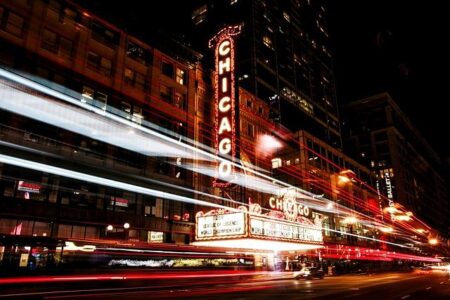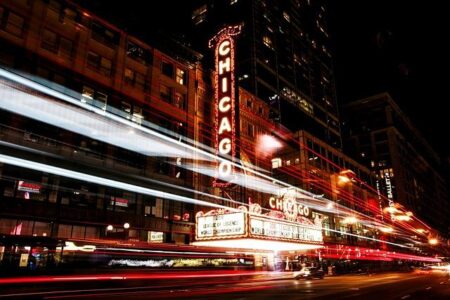Chicago’s Unified Stand: The Impact and Legacy of the “Day Without Immigrants” Protest
Immigrant Solidarity Shuts Down Chicago’s Economy
On May 1, 2017, Chicago became a vivid example of immigrant unity as hundreds of businesses voluntarily closed and residents refrained from their usual shopping and dining routines. This collective action, known as the “Day Without Immigrants,” effectively paused significant segments of the city’s economy, revealing the indispensable contributions immigrants make to Chicago’s commercial and social landscape. Across diverse neighborhoods, from bustling commercial corridors to residential streets, the absence of immigrant workers and consumers was palpable, with many local entrepreneurs openly endorsing the strike and acknowledging immigrant labor as the cornerstone of their success.
Simultaneously,public demonstrations took place near government offices,where participants voiced their dissent against the Trump administration’s intensified immigration enforcement policies. The protests were catalyzed by a surge in Immigration and Customs Enforcement (ICE) operations, including multiple raids in predominantly immigrant neighborhoods, which heightened anxiety and mobilized community resistance. Below is a summary of the protest’s tangible effects on Chicago:
| Category | Impact |
|---|---|
| Businesses Closed | Over 150 Small and Medium Enterprises |
| Economic Impact | Approximately $2.3 Million in Lost Revenue |
| Protest Participation | More than 3,000 Individuals |
| ICE Enforcement Actions | Raids Conducted in 5 Neighborhoods |
- Neighborhoods Most Affected: Pilsen, Little Village, Humboldt Park
- Response from Local Officials: Advocacy for comprehensive immigration reform and enhanced community protections
- Community Initiatives: Free legal aid clinics and solidarity events scheduled throughout the week
Residents Opt Out: A Collective Boycott Against Restrictive Immigration Policies
Chicago’s immigrant communities and allies made a profound statement by choosing to stay home and close businesses in protest of the Trump administration’s stringent immigration policies. The “Day Without Immigrants” transformed the city’s usual vibrancy into a quiet, reflective pause, with many shops shuttered and streets noticeably less crowded. Demonstrators gathered in prominent downtown locations, drawing attention to recent ICE detention raids and demanding humane immigration reforms that prioritize family unity and community stability. Activists and community leaders underscored immigrants’ critical role in Chicago’s economy and cultural identity, urging policymakers to reconsider aggressive enforcement strategies that fracture families and neighborhoods.
Highlights from the day’s activities included:
- Voluntary closure of numerous small businesses as a symbol of protest and solidarity.
- Community-led rallies featuring speeches from immigrant rights advocates and local leaders.
- A coordinated boycott encouraging residents to avoid non-essential spending to demonstrate immigrants’ economic influence.
| Neighborhood | Percentage of Businesses Closed | Estimated Protest Attendance |
|---|---|---|
| Little Village | 85% | 800+ |
| Pilsen | 75% | 600+ |
| Downtown Chicago | 50% | 1,200+ |
Organizers hope this impactful day will spark greater public awareness and inspire legislative efforts to safeguard immigrant rights and promote social equity across Illinois and the nation.
Mobilizing Against Escalating ICE Raids and Deportation Campaigns
In response to a marked increase in ICE enforcement activities, Chicago’s immigrant communities and supporters united in protest, emphasizing the human cost of aggressive deportation policies. The “Day Without Immigrants” saw a widespread closure of businesses and a significant reduction in foot traffic across key commercial areas, underscoring immigrants’ vital economic role. Demonstrators rallied with calls for comprehensive immigration reform and humane treatment of undocumented individuals, highlighting the cultural richness and social contributions immigrants bring to the city.
Events throughout the day included marches,vigils,and public addresses that stressed:
- The substantial economic contributions of immigrant populations.
- The cultural diversity and social cohesion fostered by immigrant communities.
- The urgent necessity to halt invasive ICE raids and prevent family separations.
| Protest Locations | Business Closures | Community Engagement |
|---|---|---|
| Humboldt Park | 70% | 1,000+ Participants |
| Little Village | 85% | 1,500+ Participants |
| Downtown Chicago | 50% | 800+ Participants |
Advancing Immigrant Rights: Community Strategies and Policy Recommendations
The “Day Without Immigrants” in Chicago illuminated the critical need for sustained, community-driven efforts to defend immigrant rights and promote inclusive policies. Immigrant-owned businesses, many of which closed in solidarity, showcased their economic and cultural significance. Concurrently, activists and organizations amplified their calls for reform through peaceful demonstrations and educational campaigns aimed at countering restrictive immigration measures.
Effective approaches to support this movement include:
- Providing targeted financial incentives and grants to immigrant entrepreneurs to stimulate economic growth.
- Establishing accessible legal clinics offering free immigration advice and representation.
- Forging alliances among immigrant groups,labor unions,and civil rights organizations to strengthen advocacy efforts.
- Promoting sanctuary city policies to limit local cooperation with federal immigration enforcement.
- Expanding language access services to ensure broader community engagement and participation.
Government agencies and nonprofits have identified strategic priorities to better protect immigrant populations and foster equity:
| Policy Area | Proposed Action | Anticipated Result |
|---|---|---|
| Law Enforcement Collaboration | Adopt and enforce Sanctuary City protections | Decrease in unwarranted ICE raids and detentions |
| Community Engagement | Enhance multilingual outreach and communication platforms | Improved immigrant community involvement and trust |
| Economic Advancement | Implement immigrant-focused small business grant programs | Strengthened local economy and increased business diversity |
Conclusion: Reflecting on Chicago’s Immigrant Advocacy and Future Directions
The “Day Without Immigrants” in Chicago served as a compelling testament to the profound influence immigrants have on the city’s economy, culture, and social fabric. The widespread business closures and reduced public activity highlighted the community’s indispensable role, while protests against the Trump administration’s immigration policies brought national attention to ongoing challenges. The heightened ICE enforcement actions added urgency to calls for comprehensive immigration reform and community protections. Chicago’s collective action not only underscored the interconnectedness of immigration issues with everyday life but also emphasized the critical need for continued dialog, policy innovation, and inclusive solutions moving forward.





